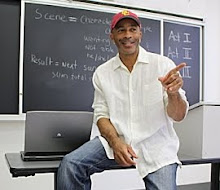WHO IS TEACHING THESE CLASSES?
"Mr. Anderson, what book on screenplay writing should I buy?"
Every time I hear this question, I think of the plethora of ‘how to write screenplays’ books out there on the market. I have not thumbed through many ‘how to write screenplays’ books in several years. When I taught at USC School of Cinematic Arts, at the beginning of every semester we were required to come up with a reading list. My required reading list on screenwriting has never waivered. I’ve only recommended three books in five years of University adjunct professorship; Ann Lamont’s ‘Bird by Bird,’ Stephen King’s ‘On Writing: A Memoir of the Craft,’ and Frederick Raphael’s ‘Eyes Wide Shut.’
I have no profound reason these are my favorites. They just appeal to me. None of these books are instructional in screenwriting, although, Frederick Raphael’s ‘Eyes Wide Shut’ is one of the most truthful accounts of what it is actually like to be a screenwriter.
I have had several people and students endorse different ‘how to write screenplay’ books with enthusiasm. I am asked, ‘have you read this one, or have you read that one?’ No I haven’t. I’m a professional screenwriter with screenwriting credits. I don’t read books on screenwriting,. One is reason is I don’t have time read them. Another is that, as a working screenwriter, if I don't know how to write a screenplay by now, I'm in big trouble. The final reason is that most of these books are written by failed screenwriters.
The truth is if I had to read any books on screenwriting, I’d better give up my WGA (Writer’s Guild of America) card. It might be fun to go into a meeting with a network or studio executive with a ‘how write screenplay’ book tucked under my arm. It may decrease my chances of getting the writing assignment or getting hired to write on a show.
There are two major reasons most books on screenwriting have not been written by professional screenwriters. One is most professional screenwriters are too busy writing screenplays or pounding the pavement to get hired to write a screenplay. The second reason is that the film and television business is a fear based industry. A great percentage of professional screenwriters believe if they teach screenwriting then they are increasing their chances of someone taking their next job. I have not done a survey, but this later reason is based on all the network and studio story meetings and all the television writing rooms I've been in. Professional screenwriters realize we are but a moment away from getting fired from our jobs.
My first job on a one hour television series, I asked a seasoned writer how not to get fired. He said ‘it’s impossible not to get fired.’ He told me, ‘all screenwriters eventually get fired.’ I gave him my best disbelieving expression and went about my business. After that season I was fired.
The reason why people pay for books and seminars from non-professional screenwriters is an enigma to me. Why would anybody consider them to be credible? Not many non-police officers teach law enforcement. Even fewer non-professional fire fighters teach fire fighting. Would you take your child to a pediatrician who has never gone to medical school and practiced medicine?
There is so much revenue generated on classes, seminars, and screenwriting contest, all by people who have never sold a screenplay, been never hired by a network or studio to write a screenplay, and never been on a television show. There are countless Universities, colleges, junior colleges, and even high schools that hire people to teach screenwriting. This is understandable. There is a need and the need has to be filled. My hats off to all the people making good money and receiving health benefits to teach something they have never done.
Maybe NASCAR will let me get behind the steering wheel at the Daytona 500. In the meantime, I'll continue to get paid to write, and to teach students the reality of how to do the same.
Saturday, May 29, 2010
Subscribe to:
Post Comments (Atom)

No comments:
Post a Comment